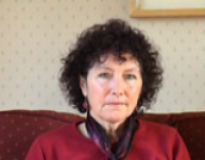Interview OV08

More about me...
Chemotherapy made her feel extremely tired and lethargic.
Chemotherapy made her feel extremely tired and lethargic.
She discussed a genetic cause with her family and decided against being tested for a faulty gene.
She discussed a genetic cause with her family and decided against being tested for a faulty gene.
Describes using relaxation meditation and how it helped her to stay calm and to sleep.
Describes using relaxation meditation and how it helped her to stay calm and to sleep.
And then also she gave me a relaxation technique to imagine that you could feel a point at the top of your head and that you traced the line down your nose, under your chin, down your chest, between your legs and up your back to the top of your head again and then you go down by your ear, down your shoulder, down your arm, up under your arm, down under your legs and then round and trace it back to your other ear and to the top of your head again. And because you'd be concentrating so much you actually wouldn't be thinking about other things. And I've done that and I felt that that is really helpful.
Had read that positive thinking would not cure cancer but believed it helped her cope and to feel better.
Had read that positive thinking would not cure cancer but believed it helped her cope and to feel better.
I've read various things about being positive, or positive thinking, and I think the latest thinking on it is that it's not supposed to be that helpful, you know, it's not, it's obviously good for you to feel positive but it's not necessarily going to change how your illness is going to affect you, you know, it's not a cure all, so. Which is quite interesting, because there have been various articles in the newspaper over the autumn and I was quite disappointed about that because I... really worked hard at... I had a healing tape, a healing meditation tape that I'd run every afternoon, when I got home, lie on the bed and listen to it. And I remember the day I read in the newspaper that positive thought wasn't necessarily going to be a cure all, that was really very disappointing.
But I think that actually that if you can sort of be as positive as possible I think that's really helpful to yourself, you know, to try and get over, and to try and feel better, you know.
Her frightening cancer experience made her make time for the enjoyable things in life.
Her frightening cancer experience made her make time for the enjoyable things in life.
I suppose that I would say that there have been some positive, amongst all the negativity and the horror and the fright, there have been some positive things. I mean I've discovered things in life that I never knew existed like sort of making yourself as comfortable as possible and, you know, having all the nice things like sort of having lovely baths and, you know, aromatherapy, listening to nice music, trying to do as many feel-good things as possible.
I probably have worked too hard right throughout my life to have enjoyed those things, so there are definitely positive things to, you know, apart from being quite frightened a lot of the time.

